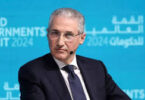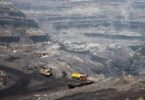DUBAI (AFP): The Emirati head of the United Nations climate conference has insisted that he respects climate science after he came under fire over a leaked video in which he questioned the science on fossil fuels.
Amid tough talks over the future of fossil fuels, Sultan al-Jaber, who is also head of UAE national oil company ADNOC, hit out at “repeated attempts to undermine” the work of the COP28 presidency in Dubai. “We’re here because we very much believe and respect the science,” al-Jaber told a press conference on Monday.
Al-Jaber complained to reporters that “one statement taken out of context with misrepresentation” had received “maximum coverage”. Showing how touchy the issue has become, Jim Skea, the head of the UN body tasked with assessing climate science, appeared alongside al-Jaber to face reporters. He said al-Jaber “has been attentive to the science as we have discussed it and I think has fully understood it”.
Al-Jaber said global greenhouse gas emissions must be cut by 43 percent by 2030 to limit warming to 1.5 degrees Celsius from pre-industrial levels – a reduction outlined by Shea’s UN Intergovernmental Panel on Climate Change (IPCC). The Guardian newspaper published a video on Sunday showing al-Jaber having a testy exchange with former Irish president Mary Robinson during an online forum.
“I’m not in any way signing up to a discussion that is alarmist,” al-Jaber told the SHE Changes Climate online conference on November 21. “I am factual and I respect the science, and there is no science out there, or no scenario out there, that says that the phase-out of fossil fuels is what’s going to achieve 1.5 (degrees).”
The video sparked an outcry among NGOs, which were already outraged by the appointment of an oil company boss to head the crucial climate negotiations. “If the COP28 president is guided by science and 1.5C remains his North Star, he must draw the right conclusions: nothing short of a full and rapid phase-out of fossil fuels will get us there,” said Romain Ioualalen, of Oil Change International.
Al-Jaber said on Monday that he has said “over and over that the phase-down and the phase-out of fossil fuel is inevitable”. Although he also said it in the video, al-Jaber had previously only talked publicly of the inevitability of a “phase-down” – a weaker term as it implies that fossil fuels would not completely go away. Adding to the confusion, the website of the COP28 presidency published a summary of the first few days of the talks which said that 22 heads of state and ministers discussed “the phase down of fossil fuels”.
It did not mention a phase-out, which many heads of state and government and UN Secretary-General Antonio Guterres called for during speeches on Friday and Saturday. A first draft of a COP28 agreement released on Friday included both options – a “phasedown/out” of fossil fuels, which are the largest contributors to climate change. Negotiators must now find common ground during talks due to end on December 12, with an agreement on the fossil fuels seen as key to the success of COP28.
Participants in the talks told the AFP news agency that the European Union, several Latin American countries and island nations back the 1.5C target, which implies a rapid phase-out. Other developed countries, including oil producers such as the United States, Canada, Norway and Australia also defend the 1.5C goal but with less ambitious paths out of fossil fuels.







